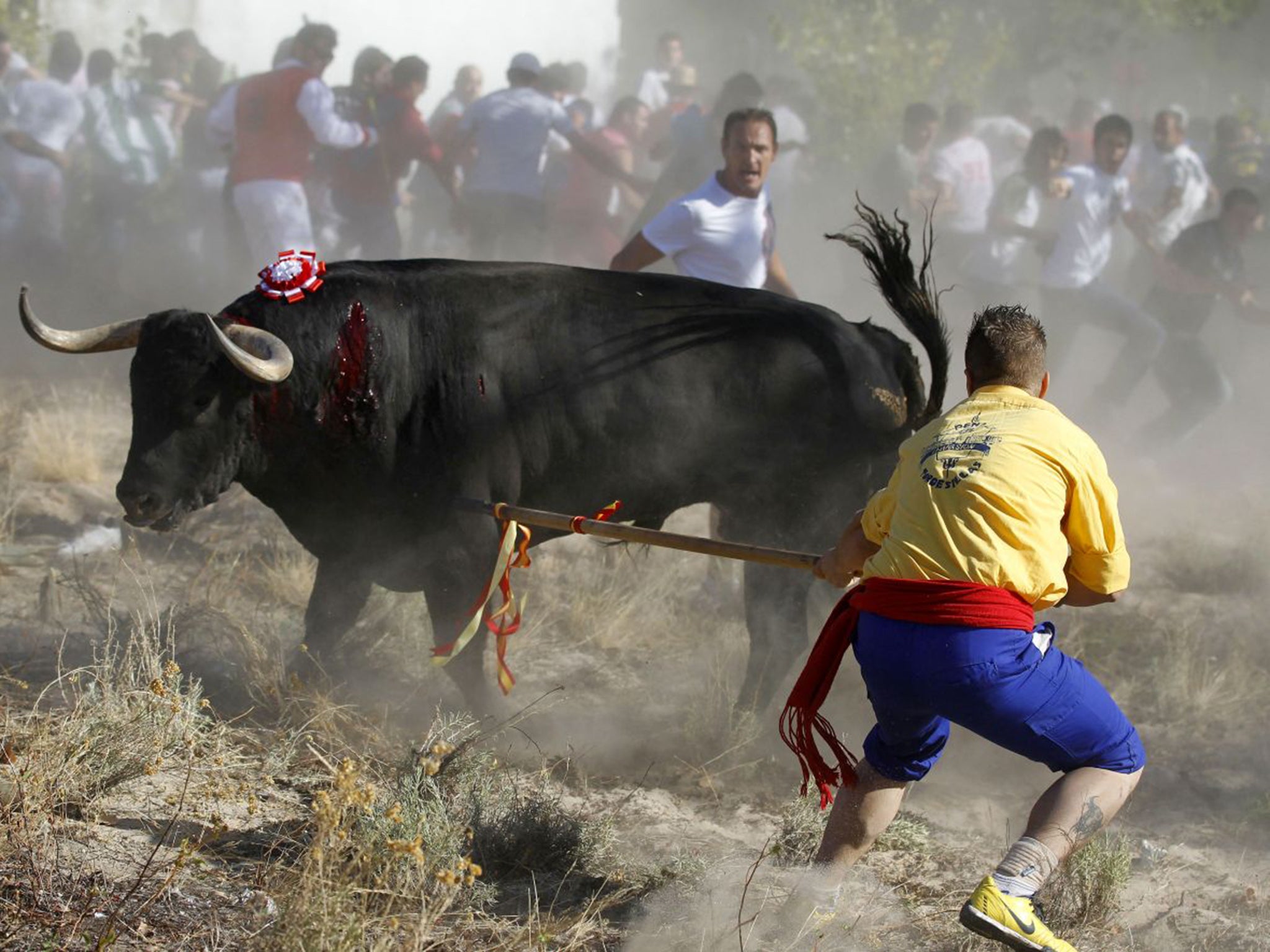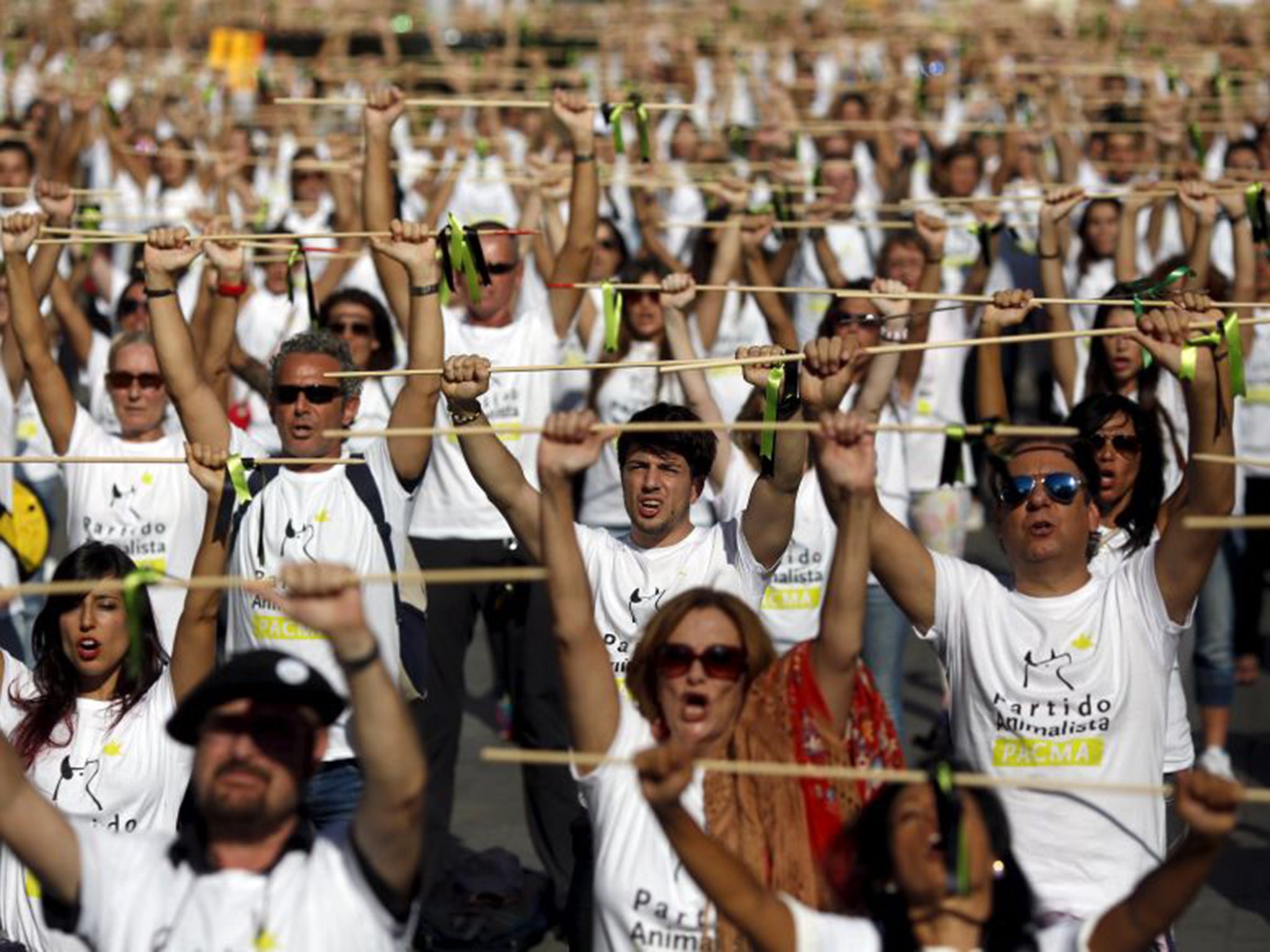Protesters gather as Spanish town of Tordesillas prepares for bull-spearing event
The event, in which a bull is pursued by men on horseback and speared to death, divides local opinion

Your support helps us to tell the story
From reproductive rights to climate change to Big Tech, The Independent is on the ground when the story is developing. Whether it's investigating the financials of Elon Musk's pro-Trump PAC or producing our latest documentary, 'The A Word', which shines a light on the American women fighting for reproductive rights, we know how important it is to parse out the facts from the messaging.
At such a critical moment in US history, we need reporters on the ground. Your donation allows us to keep sending journalists to speak to both sides of the story.
The Independent is trusted by Americans across the entire political spectrum. And unlike many other quality news outlets, we choose not to lock Americans out of our reporting and analysis with paywalls. We believe quality journalism should be available to everyone, paid for by those who can afford it.
Your support makes all the difference.The posters for this week’s carnival are up. A large travelling funfair has erected long lines of go-karts and bouncy castles. But, given the controversy around one of the highlights of the festival, how much conviviality will there be in the town of Tordesillas, Spain?
On 15 September, as happens every year during the part of the carnival known as El Toro de la Vega, a bull is pursued by men on horseback and speared to death. And, as has also become a tradition, thousands of protesters gathered in Madrid to symbolically break spears and protest against what they say is extreme animal abuse.

The supporters of Tordesillas’s bull “spectacle”, of whom 40,000 turned out last year and 37 have signed up in 2015 as spear-bearers, argue it is a centuries-old tradition – and one that can inspire intense pride. In 2011, for example, the man whose spear apparently proved fatal for a 608kg bull named Afligido (Heartbroken) said he felt “like [footballer] Christian Ronaldo”.
The violence, controversy and tension are not limited to the bullspearing itself. There are invariably scuffles as supporters and protesters clash, with up to 30 people injured last year as stones were thrown during the killing of El Elegido (The Chosen One). This September, 150 police will be bussed in to keep the peace.
More recently, Spanish band La Union cancelled its gig during the festivities, alleging “pressure” from animal rights activists. Last week, the mayor, José Antonio González Parcela, was surrounded by about 20 activists shouting “Toro de la Vega abolición” and had to be escorted to his car by police.
Mr González Parcela has met the activists – whose organisations have condemned the threats – to try to defuse the situation. But discussing the festival with the people of Tordesillas is not easy. One burly middle-aged man instantly makes a “no comment” gesture and turns back to his drink when asked about El Toro de la Vega – posters of which adorn the bar where he’s standing. Other locals are equally unforthcoming, although in nearby Valladolid, the Partido Popular party politician Jesús Julio Carnero told local newspaper El Norte de Castilla “the Toro de la Vega is a legal, deep-rooted tradition”.
Mr González Parcela’s Socialist Party leader, Pedro Sánchez, is less sympathetic, however, saying that, if he gains power in upcoming elections, he will ban the “shameful” event. This year, an online petition calling for the Socialists to expel the mayor of Tordesillas from their party gained 120,000 signatures.
“Nationally and internationally, the pressure is rising against these sorts of abusive activities,” says Antonio Moreno, president of the animal rights association CACMA. Hundreds of millions of euros are spent each year on bullfighting spectacles, he claims, “and that’s public money that could be used to subsidise family businesses hit by the recession”.
Some animal rights groups believe Spanish laws largely fail to protect animals, and that penalties such as fines do not help. In the town of Cazalilla, for example, where a turkey is thrown from the church tower each February, the regional government imposes a minimum fine of €2,001 (£1,470) – which locals organise a whip-round to pay. And for all that the left-wing party Podemos has helped to create a new politics in Spain, Mr Moreno was critical of what he feels is a “lack of clarity in its programme” about animal rights. Meanwhile, the feuding over the bulls of Tordesillas, and other such activities, rages on.
Join our commenting forum
Join thought-provoking conversations, follow other Independent readers and see their replies
Comments